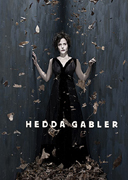
Margaret Croyden
About Hedda Gabler
American Airlines Theatre-227 W.
42nd St. New York, NY 10036
Tuesday throught Sunday, matinee on Wednesday, Saturday and Sunday
Between $65.00 - $110.00
Closing date : March 29, 2009
http://www.heddaonbroadway.com/
Reviewed by Margaret Croyden February 10, 2009
 |
| Hedda Gabler poster |
Every few years some actress gets into her head that she wants to play "Hedda Gabler"-- one of the juiciest parts that Ibsen ever wrote, never mind one of the most complicated. This year Marie-Louise Parker is the latest to bring to the stage the mysterious Hedda. I say mysterious because Hedda's motivations are complex, her life is complex and she is difficult to figure out. That is-- for some actresses. I have seen a few Heddas in my life, most from experienced English actresses who, with a turn of the head and a look of the eyes were able to tell us what Hedda was really like. But lately, inexperienced television stars and mediocre movie actors have taken a liking to the stage and rather than remaining in their juicy salaried jobs, they come on to us in classics. Of course Marie-Louise Parker is not the only one, but she is the one people are talking about now. Rather they are also talking about the interpretation that she and the director Ian Rickson gives us.
Is Hedda the bitch, the ruthless ingrate, the nasty, rude, insolent woman who insults everyone for no reason? Would she be apt to expose her behind in a senseless opening of the play? Is she the one doomed by her nastiness, her competitvness a destroyer of a man's life long masterpiece because of what? Jealously, envy. maliciousness? Is she all these things? A modern Jezebel? But even Bette Davis' Jezebel was redeemed in the end. If Hedda were all these things, why did Ibsen write this play and create this so called monster?
The trouble with most so called new interpretations of masterpieces, the adapter (Christerpher Shinn) thinks he knows best what Ibsen was trying to say, and insists on giving emphasis to aspects of the play that might only have been hints of the real character. But it takes a brilliant director and a brilliant actress to find the truth behind Hedda and her motivations that lie beneath the surface.
The most important thing about Hedda is that she was born at a time in a provincial country where women with intelligence, (even women of means), had no chance to express themselves, or to work, or to fulfill their ambitions. Hedda was no different. She came from a "good" family; she was adored and pampered by a father who taught her how to use a pistol but kept her in her place. An intelligent woman like Hedda grew to hate her existence. Married off to a dolt, a academic without verve or imagination, she felt superior to her husband and was squelched from the beginning. Living a mundane life in provincial Norway, with its cold winters and lack of sun, Hedda may have been spoiled by her imperious fathers who instilled in her a sense of (false) superiority; she expected more out of life. But life was not kind and her so called superiority proved worthless; she inverted her emotions, repressed her desires, and grew to hate herself. Ultimately this hatred was directed at others. Not being able find satisfaction, affection or understanding, unable to express, or be aware of her real feeling, her hatred grew towards everyone. Hostility was her outlet, anger was her friend. Unconscious of her inner life, thwarted by an unhappy old love affair, she acted out her negativity. Those that came in contact with her were the object of her hatred, (actually self-hatred). In the end she had to be alone. She had ruined everything she touched and knew it and therefore she had to kill herself.
In reality Hedda knew what she was but could find no help for her condition; she was a woman of her times, frustrated, unemployed, childless, with a self involved husband with no purpose in life, her end was predictable.
No, she was not a beast, a nasty piece of work as delineated by this production. The actress and the director failed to uncover Hedda's inner life and accepted all its outer manifestations.
Ibsen knew this kind of frustrated woman who was the butt of a male society its all its rules and regulations and he knew women of his generation found no outlet for this lives, or for their creative spirit; If they did not escape their environment, they would destroy themselves. Nor in the Doll's House escaped, Had Nora in "The Dolls House" not left her husband, she may have turned into a Hedda and suffered the same fate.
I don't think this director or this actress understood the play and that is a pity. New productions, new interpretations are sometimes misleading. It is far better to stick to the original. Never mind the "new" which usually ruins the "old." A masterpiece remains a masterpiece and needs no "new" updating by anyone.
Margaret Croyden's latest book is "Conversations
with Peter Brook, 1970-2000" (Fairer, Straus and Giroux).
| museums | NYTW mail | recordings | coupons | publications | classified |
